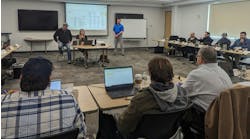RECENTLY AN old friend, who had come up through the project management ranks with me and started his own successful mechanical contracting business some years back, called to tell me to stop work on a side estimating job that I had been doing for him. He had just lost his general liability insurance and was facing the likely prospect of having to shut his doors for good.
When I pressed for more information, all he would say was the obvious that we both already knew: When you’re a small contractor and have two, three or four lost-time accidents in less than a six-month period, you’re screwed. Insurance companies just don’t cotton to businesses that actually use their services.
That got me to thinking about my own personal experiences with project management job safety issues, something that’s been dear to my heart. Actually it’s dear to my right ankle, which was destroyed in a jobsite accident when I was only 17 years old and which left me 28% disabled for life.
As foreman on that particular job (yes, I was a working foreman at age 17), should I have been able to foresee and prevent the accident that crippled me? Yes, but. Yes, but probably, maybe, probably not really, probably yes, really.
As the responsible party running my crew nearly 30 years ago, should I have more closely noticed that four-gang electrician’s box that was turned upside down on the newly finished quarry tile floor in the kitchen area of the restaurant remodeling job we were working at? Should I have avoided stepping on it and subsequently falling backwards with my ankle sliding under my butt – my 250-lb. weight crushing it? Yes, I should have been more careful.
But when every single job is full of such “landmines” just waiting to go off, even perpetual vigilance can’t catch everything.
Only two occupations mandate use of hardhat protective gear, the first being a frontline combat soldier and the second being a frontline construction worker. Why? Because they’re both equally dangerous.
If you stay in the field long enough as a working field employee, it’s not a question of if you’re going to get hurt, but only of when and how badly.
Over the years when I’ve wanted to spend an extra dollar a pair for better safety glasses or a couple hundred bucks on extra safety harnesses to make sure all my guys working on ladders and scaffolds could be properly tied off, or rent another section of trench box that wasn’t in the estimate because of re-routing problems encountered in the field, the universal refrain that I’ve always heard from my bosses is, “You can’t do that, that costs money!”
To which I always replied, “Yeah, but a huge OSHA fine would cost us more if we’re caught not doing it, and a lost-time accident would cost us far more in increased insurance premiums than even the fine from OSHA would.”
Since my bosses signed our checks I usually lost these arguments. But at least I got on record as disapproving of what I considered to be penny-wise and dollar-foolish.
One of my favorite safety proverbs is “job safety doesn’t cost, it pays!”
Think about it. You might only need to spend 0.5% of your total job budget for such things as mandatory attendance weekly toolbox talk safety meetings for all jobsite employees, a decent first aid kit and a one-day Red Cross basic first-aid training course for one responsible person (yourself?) on how to use it so minor injuries don’t end up at the emergency room. Get rid of broken down ladders and chewed-up drop cords. Spend a couple bucks a day for ice for the job Igloo water coolers that prevent dehydration and boost concentration. If, at the end of the job you’ve not had a single lost-time/lost-money accident, have you spent money on safety or have you made money on safety?
When you make safety such a driving force on your jobs that there’s never a chance your company’s general liability insurance coverage will ever be canceled for any reason and your workers’ comp and other mandatory insurance coverage premiums are kept as low as possible, have you cost your company a few dollars in chump-change profits, or have you helped them keep their doors open?
H. Kent Craig is a second-generation mechanical contractor with unlimited master’s licenses in plumbing, boilers, heating and air conditioning. You may contact him via e-mail at [email protected], or by phone at 919/851-3985.

